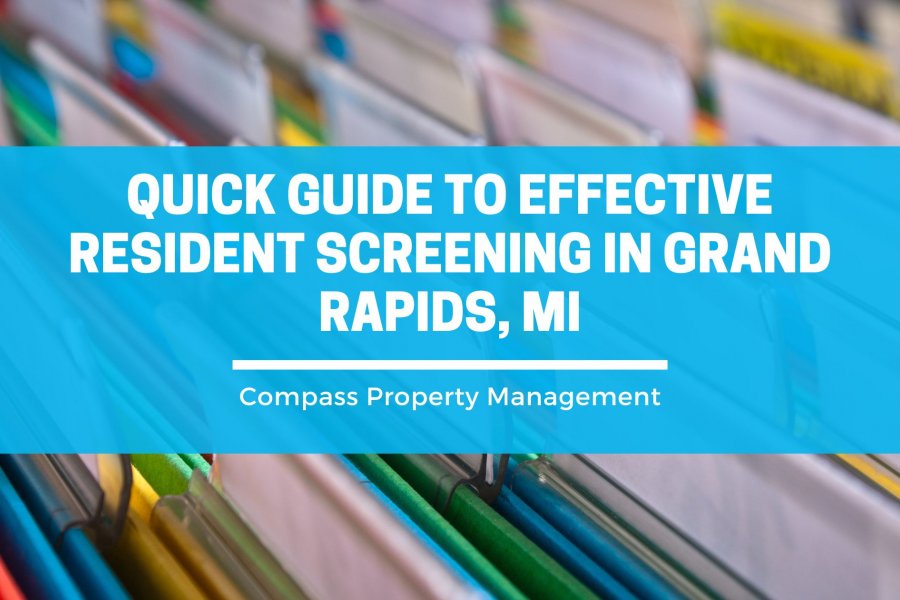
As a landlord in Grand Rapids, Michigan, one of your primary goals is to find residents who will pay rent on time, maintain the property, and adhere to the terms of the lease agreement. Effective resident screening is crucial in this quest. A meticulous resident screening process minimizes the risks of property damage, eviction, and loss of income.
Renting out a house in Grand Rapids isn't easy, but we're here to help! Use this comprehensive guide to help you screen residents effectively.
Why a Resident Screening Process Is Important
Resident screening helps you gauge the reliability and suitability of a prospective resident. Without it, you open the door to potential financial and legal headaches, including the cost of evictions, non-payment of rent, and damage to your unit.
A proper resident screening process not only ensures you are getting the right occupants for your rental, but it should also be compliant with fair housing laws and other local laws, avoiding discrimination lawsuits.
How to Screen Residents
Screening residents involves a series of steps designed to gather information about the rental applicants to make an informed decision, such as the following:
Step 1. Set Your Criteria
Before advertising your rental, establish clear, non-discriminatory criteria for resident selection. This may include income requirements (most landlords prefer that the resident's gross income is at least three times the rent), a credit score minimum, rental history including the applicant's previous addresses, employment history and current status, and acceptable background check results.

These criteria must comply with all federal, state, and local laws, including fair housing laws. You should also get the applicant's consent before performing background and credit checks.
How to Identify Quality Residents
Quality residents are those who have a history of being responsible and financially stable. They may become long-term residents of your rental.
Indicators of such residents Include:
● A good credit score
● A consistent employment history
● A reasonable income
● Positive references from previous landlords and neighbors
● A clean background check and criminal record
Step 2: Review Rental Applications
Start by ensuring that the rental application is comprehensive. It should request the applicant's full name, current and past addresses, employer information, income details, and references. Upon receipt, review applications against your pre-set criteria. Look for consistency in their responses and completeness of the rental application.
Step 3: Income and Employment Verification
You want to rent to a resident who will be able to cover the security deposit and pay rent each month. To verify income and employment, ask for recent pay stubs, bank statements, or a W-2. Call the employer to confirm the resident’s employment status and salary.
But before doing so, make sure to do your research to confirm the legitimacy of the company. Sometimes, fraudsters will make up names of contact persons at work with fraudulent phone numbers if they don’t have a proper job or employment to declare.
For self-employed applicants, request tax return documents or other proof of income. If you can, visit their business address, or do an online search to verify if the business really exists. This way, they'll be able to pay their monthly rent and the security deposit.
Step 4. Contact Prior Landlords
One of the most critical steps in the resident screening process is contacting their previous landlord. Their firsthand experience with the prospective resident can offer you valuable insights into a tenant’s behavior and reliability. Here's how to approach this step effectively:

● Obtain Consent
Firstly, ensure you have the resident’s written permission to contact prior landlords. Consent is typically given within the rental application or a separate consent form.
● Validate Landlord Identity
Before diving into questions, confirm you’re speaking with the actual former landlord. You can do this by checking property records to ensure the person you’re communicating with owns or manages the rental in question.
Make sure that the person you are speaking with is indeed the former landlord, not a friend or relative of the resident posing as one.
● Prepare Your Questions
When you have confirmed the landlord’s identity, proceed to ask specific, open-ended questions that encourage detailed responses.
Here are several key questions to consider:
● Confirmation of Tenancy: Start by confirming that the individual was indeed their previous resident. Ask for the dates of tenancy to ensure they match up with the application details.
● Payment History: Inquire if the resident consistently paid their rent on time. Late payments can be a red flag and indicate potential issues with cash flow or financial management.
● Property Care: Ask how well the resident maintained the property. Did they leave the rental in good condition upon moving out? Were there any instances of damage beyond normal wear and tear?
● Lease Compliance: Did the applicant adhere to all the terms of the lease? This includes following rules regarding pets, noise, and other specific policies.
● Neighbor Relations: Were there any complaints from neighbors or other residents? This could tell you about the resident's ability to live in harmony within a community.
● Renewal Offer: Perhaps one of the most telling questions–would the landlord lease to this individual again? A hesitant or negative response could indicate underlying issues that weren’t explicitly mentioned.
.jpg)
● Reason for Leaving: Understanding why the resident left can also be insightful. Was it a mutual decision? Did the resident leave of their own accord, or were they asked to leave?
● Legal Issues: Without violating privacy laws, ask if there were any legal disputes during the tenancy. Even small claims court issues can be red flags.
● Promptness and Communication: How did the applicant communicate with the landlords and property managers they rented from before? Were they courteous and prompt when responding to inquiries or addressing issues?
● Early Lease Termination: If the applicant ever broke a lease, ask for the circumstances. Sometimes life events like job relocations can lead to a justified early termination, but other times it might reflect instability or disregard for contractual commitments.
● Rent Increases: Ask if the rent was raised during the tenancy and how the tenant responded to it. This can tell you about the resident's financial flexibility and their reaction to changes that are often a part of long-term tenancy.
Step 5: Credit and Background Checks
A resident’s credit report can give you a glimpse into their financial responsibility. Look for red flags like bankruptcies, very low credit score, eviction history reports, and consistent late payments or outstanding unpaid rent. A background check is equally important as access to criminal records can reveal criminal history that could put your investment property or other residents at risk. In Michigan, you must have the resident’s written permission to pull their credit report.
How to Accept or Deny Prospective Residents
After evaluating all the information, it’s time to decide. If you choose to accept a resident, ensure that all lease agreements are clear and detailed before signing.

If you decide to deny an applicant, you must inform the resident in writing. In general, you don’t necessarily need to provide a reason for the rejection. You may simply tell the prospective resident that the rental is no longer available.
If the resident asks for a specific reason, you must be ready to provide one that must be non-discriminatory and based on your pre-set criteria. Make sure to remain in compliance with the Fair Housing Act, which prohibits you from rejecting applicants based on race, sex, national origin, familial status, skin color, religion, and disability. Violating fair housing laws can come with serious consequences.
In the case of denial based on credit information, the Fair Credit Reporting Act requires that you provide an "adverse action" notice, which includes the credit reporting agency's contact information and a statement about the applicant's right to dispute the accuracy of the report.
Bottom Line
Building a comprehensive resident screening process can be difficult, but it's essential for landlords in Grand Rapids, MI. By following these steps, you can find reliable residents and protect your rental properties. When in doubt, it’s best to work with a reliable property management company in Grand Rapids like Compass Property Management. Contact us if you need help and one of our property managers will be happy to assist you!
